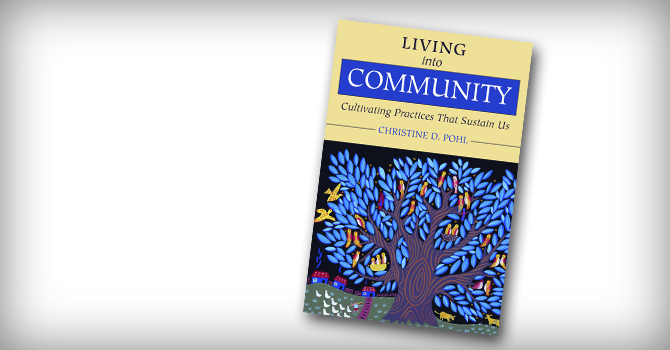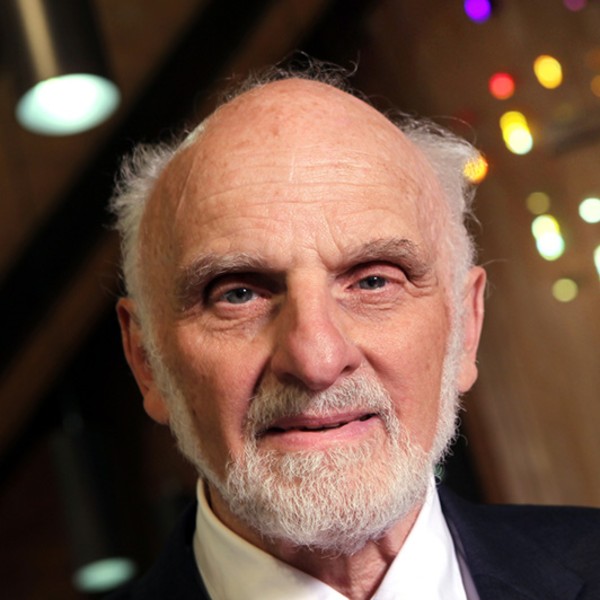Editor’s note: In her book “Living into Community,” Christine D. Pohl offers insight into four practices of Christian life: Embracing gratitude; making and keeping promises; living truthfully; and practicing hospitality. Pohl explored the practices of pastoral excellence within community as part of the Sustaining Pastoral Excellence project funded by Lilly Endowment Inc.
In this chapter of the book, Pohl considers ways to strengthen the practice of living truthfully in families, congregations and communities.
As we draw closer to the source of truth and live gratefully in response to the one who has taken us from darkness to light, our desires and longings can be reshaped. We can grow into living truthfully and loving truth. While living truthfully involves self-discipline and thoughtful reflection, it is most fully linked to embracing God’s desire for truth in our inward being (Ps. 51:6).
The Quaker tradition offers time-tested suggestions for fostering truthful living. They include these four: (1) Listen “for the truth in the words of others”; (2) Speak the truth as you understand it with “cordiality, kindness, and love”; (3) Avoid “gossip, tale bearing, breaking confidences, or the disparagement of others”; and (4) Resist “temptations to falsehood, coercion, and abuse.” Adopting these commitments would transform many interactions and communication patterns in our families and congregations.
When we think about truthfulness in relation to speech, we do not often assume that listening is a top priority. But listening is at the heart of wisdom and discernment. Additionally, truthful words cannot stand alone; they must be supported and sustained by a “congruent” life. If we begin with an inner commitment to “speak without deception,” we will find that truthful speech and living become more natural.
A community that loves the truth will understand the wisdom of silence. Speaking truthfully, as Mennonite theologian Alan Kreider notes, does not mean that we will “always say everything we think or know. There is ample room, in the truthful life, for silence, discretion, the keeping of confidences and even the pleasantries that lubricate social interchange. … But this does mean that we are committed to making the words that we utter true words.”
Congregations, families, or communities that want to grow in truthfulness might invite their members to monitor their speech for several days, keeping a diary of every time they said something that was not true. They could then reflect on the kinds of lies they told, the reasons they did so, and how they could have responded more truthfully.
L. Gregory Jones, ethicist and theologian, describes his experience with this exercise. He and his students decided to try to live a week without telling any lies. Soon they realized that “all of us would have to be quiet much more often as we discovered situations and relationships in which it is better not to speak than to utter statements that are not true.”
In Ephesians 4, we find that individual and communal maturity in Christ are closely connected to “speaking the truth in love” (Eph. 4:15). New life in Christ is characterized by speech that gives grace: “Let no evil talk come out of your mouths, but only what is useful for building up, as there is need, so that your words may give grace to those who hear” (Eph. 4:29). A check on our behavior might include regularly examining ourselves as to how our words are giving grace and how they reveal that we are being conformed to the image of God (see also Col. 3:9-10).
Communities that are concerned about truthfulness will be attentive to structures and patterns of life together that encourage or discourage truthful living. What do we do together that helps members learn to tell “tactful truths instead of reassuring lies”? How are truthfulness and grace modeled by the leadership? What structures are in place to help us keep short accounts among ourselves? Where do we allow ourselves freedom to ask one another hard questions about important dimensions of our lives?
In families and other close communities, sometimes we operate with a version of a “don’t ask, don’t tell” policy. We overlook or accommodate patterns of behavior that ought to be challenged. Sometimes a caring outsider can see clearly and speak truthfully about difficulties within a community. Although we formalize this with “consultants,” it can be more informal as well. A faithful friend who will speak truth to us is a precious gift. A person who loves us enough to name difficult truths and risk our response can keep us from self-destruction.
Jesus’ teaching in Matthew 5:23-24 challenges us to take individual initiative in repairing damaged relationships by going directly to the other person involved to seek reconciliation. Within congregational life, Jesus also encourages direct and personal interaction, and only when that fails are other “witnesses” to be drawn in (Matt. 18:15-17).
Communities that love truth will make a safe place for the awkwardness of confession, forgiveness, and healing. Where truthfulness and confession are practiced, communities depend on fidelity, the assurance that members won’t abandon one another as they reveal their sins and weaknesses and move toward maturity and holiness. Truthful communities are communities of encouragement and hospitality. As Miroslav Volf explains, “Without the will to embrace the other there will be no truth between people, and without truth between people there will be no peace.”
A Word Fitly Spoken: The Importance of Discernment
While the practice of discernment is important for every other practice, it is central to living truthfully. Communities that practice discernment are prayerful in seeking the best way to address important truths. They are attentive to details and to the processes that are needed to help people hear, receive, and speak truth. They notice small lies and deceptions early, and do not ignore the difficult issues.
No one speaks all the truth all the time; the practice of discernment assists us in knowing how and when to speak. Although we might attend to various aspects of a situation in order to be truthful, there is still a lot we do not say. For a number of reasons, we almost always need to select. As noted previously, speaking truthfully is not the same as saying everything that comes into our heads.
Truth-telling should always include discernment, an element of the fitting. We don’t tell children everything, and yet we still seek to be truthful with them. We hold some things back to protect their well-being, or because they lack the conceptual categories or experience to understand particular details. Under certain circumstances, even with adults, there are legitimate concerns about appropriateness, responsibility, and timing.
An interesting example of discernment and timing comes from John 16:12-13, when Jesus says to his disciples, “I still have many things to say to you, but you cannot bear them now. When the Spirit of truth comes, he will guide you into all the truth.” The time would come for the disciples to be told additional truth, but until then, the words would be unbearable. “A word fitly spoken,” as Proverbs 25:11 says, “is like apples of gold in a setting of silver.”
Creating a culture of truthfulness involves knowing when we should speak, and when it is appropriate to conclude that God is at work and we do not need to say anything. It requires patience and wisdom to know what ought to be borne for a time, and what should be confronted.
Timeliness is an important aspect of discernment, however. If we wait too long to address certain difficulties or conflicts in community, they can reach a point where it is too late to repair them. Naming deception early or identifying disagreements quickly helps to keep us from walking down paths from which it is hard to return. A recognition of timeliness also means that we will not store up all our grievances and then dump them in one moment of aggravated “truth-telling.”
Discernment requires fidelity, staying with something long enough to understand it. It means noticing what others overlook, and often involves a capacity to see patterns or connections where others see only brokenness. But there are situations in which timeliness and taking time to understand and give a measured response are in tension. Circumstances as well as our own finiteness can require that we move ahead without having all of the details in place.
Handling Disagreements Redemptively
If our communities develop the habit of delighting in the truth, we will be in a better position to deal with the inevitable conflicts and disagreements that are part of shared life. As we face conflict, truth-telling should include remembering and rehearsing who we are. We do this in teaching, preaching, and liturgy, reminding ourselves of our identity, to whom we belong, and the common commitments we cherish.
In situations of major conflict, where interpretations of events and motives are highly contested, it can be helpful to name truthfully what we can agree on. We can learn to ask specific questions. Seeking and speaking the truth about particular matters helps with broader truth-telling regarding who we are and how we can move forward. And a truthful community resists the impulse to use pep talks to cover over major problems. Substituting enthusiasm for truthful reflection brings neither resolution nor freedom.
Whether in marital or congregational disagreements, it is hard to get to the root of the difficulty if the parties will not sit down together and talk with one another. Creating a place that is safe for each to hear the other requires establishment of ground rules and a loving and truthful guide. Addressing generalities can seem safer, but speaking truthfully to one another, whether in the form of affirmation or critique, is most helpful if it involves specifics.
Chris Rice recalls the advice that their beloved friend and advisor John Alexander gave to the members of the Antioch community about handling their disagreements, tensions, and sins. “One of the foundations of community is knowing that you will sin and be sinned against. It needs to be our daily expectation. But there also needs to be an expectation of forgiving others their sins and being forgiven.” He continued, “Expecting ourselves to be bad can’t be an excuse not to change and grow.” He challenged them further, “You need to learn to confront openly and without apology. But also without dogma, without anger.”
In confrontation, it is generally best to speak about difficult matters face-to-face. Words of affirmation and encouragement can be reread and reinforced when put in writing, but when hard words are recorded, they are often read over and over again with little benefit and with increasingly less context.
Practicing “Clear”
The Good Works community has developed a ritual that helps staff members address interpersonal tensions before they become major disruptions. They recognize the central importance of walking together in truth and of following Jesus’ teaching about laying our gift at the altar and seeking reconciliation and forgiveness from one another. They call the practice “Clear.”
At their weekly staff meetings, the first question they ask one another after the opening prayer is “Are we clear?” Keith Wasserman explains, “This has now become a code word for ‘Do you have anything you need to say to me about how you and I are doing or about how we are getting along and working out this thing called salvation?’” Is there something that we need to talk about before we “move into the business of the ministry”?
He notes that this practice has deepened trust and established an accountability structure that “forces our lives into the light with one another.” Their approach also recognizes that interpersonal tensions have a great impact on the entire community. “This kind of discipleship nurtures and rewards truth-telling,” he concludes. “What holds our community together must be both truth and love.”
The structure created by Good Works makes room for truthfulness and keeps conflicts from festering. The community has been able to avoid the downward spiral of resentment that is common among coworkers who serve in highly demanding ministries. Because being a whole and holy community is important to them, they allow the time needed for this process. If someone is not “clear,” there is structure and support to work through a biblical framework for reconciliation based on Matthew 5:23-24.
Oaths and Word-Watching
When we want to assure someone that we are being truthful or sincere, we sometimes preface our comments with words like “To be perfectly honest …” or “Frankly …” or even “To tell you the truth …” But, as Alan and Eleanor Kreider rightly point out, such statements bring all of our other speech into question: Are we not being truthful the rest of the time? If we live and speak truthfully, such assurances will not be needed.
Another way we attempt to establish or guarantee truthfulness is through the use of oaths. In their book Kingdom Ethics, Glen Stassen and David Gushee argue that oath-taking “has an inherent danger in it. It establishes a two-tier system of speech.” Like the Kreiders, they wonder, “When I speak under oath or swear that my words are true, then you as my listener are supposed to be able to have confidence in my words. But what, then, is the status of what I say when I am not swearing or not under oath? … The very existence of an oath-level of speech threatens to render (or unveil) everyday speech as less trustworthy.”
While the Christian tradition is mixed in its response to oath-taking, Jesus’ command in Matthew 5:33-37 is at least a powerful check on the use of oaths. He affirms honest and straightforward speech: “… I say to you, do not swear at all. … Let your word be ‘Yes, Yes’ or ‘No, No’; anything more than this comes from the evil one.”
Alan Kreider argues that the most important reason to reject oaths is “to reassert the Christian concern for truth-telling. When Jesus repudiated the oath, his main concern was to call a halt to two-level truth-telling, to the ‘differentiation between the words which have to be true, and those which don’t have to be true.’ … Our ‘no’ is thus to oath-taking; our corresponding ‘yes’ will be to truth-telling.” We would do well to see ourselves as “stewards” of words, recognizing that language is a treasure entrusted to our care.
A deepened commitment to living truthfully could change our individual character and the quality of our common life. Truthful living in the context of grace, gratitude, fidelity, and hospitality gives powerful testimony to the one who is the way, the truth, and the life.
“Living into Community: Cultivating Practices That Sustain Us,” by Christine D. Pohl.
Copyright © 2012 Christine D. Pohl. Reprinted with the permission of Wm. B. Eerdmans Publishing Co.
















